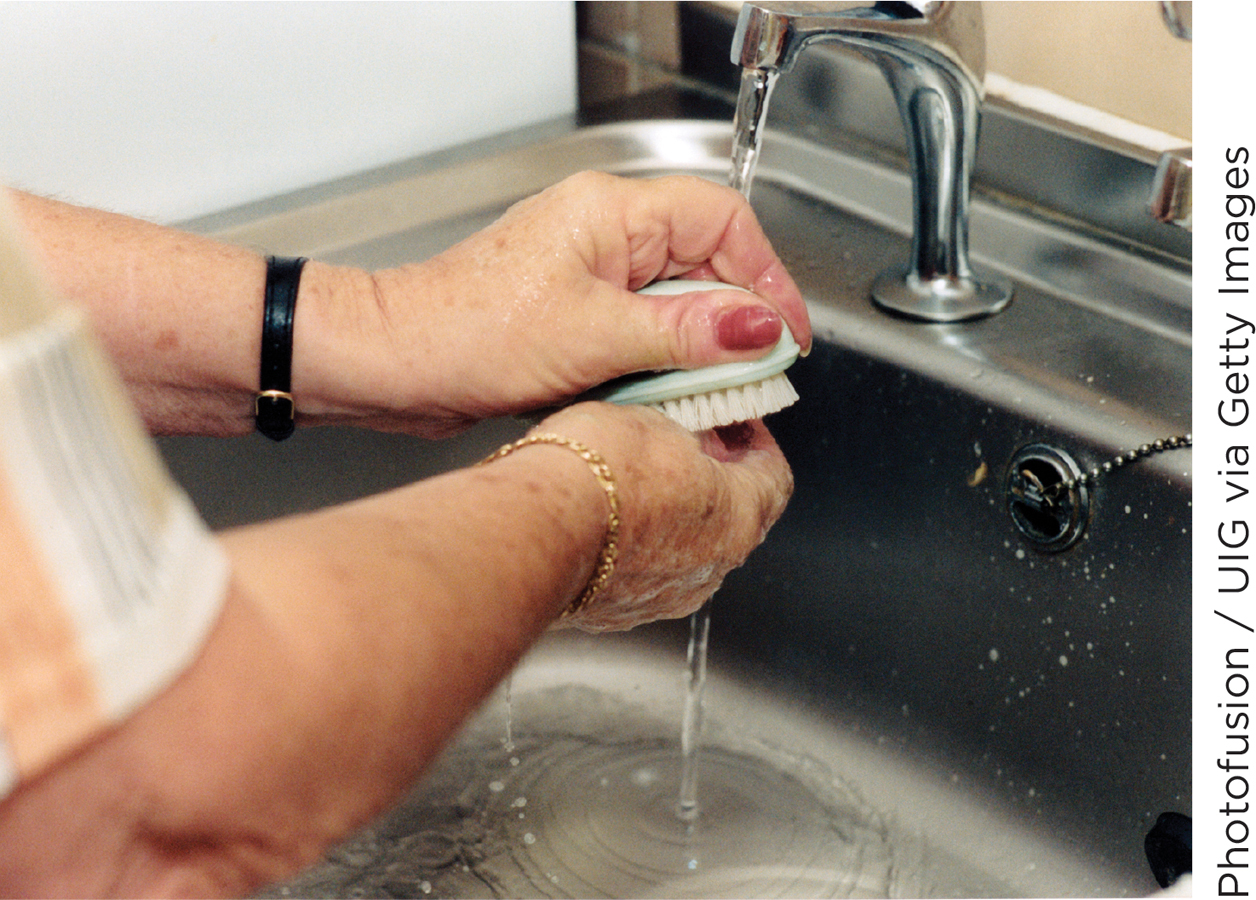15.6 Obsessive-Compulsive Disorder
Preview Questions
Question
 What defines obsessive-
What defines obsessive-
 What therapies effectively treat obsessive-
What therapies effectively treat obsessive-
“Feeding the dog took two hours as I checked and re-
695
Obsessions are recurring, intrusive thoughts about potential danger or harm.
Compulsions are repetitive actions taken to prevent the dangers and harms imagined in the obsessions. People with OCD engage, over and over, in actions such as checking the locks of a door, washing their hands, or arranging household items in a strict order.
Dog feeding unfortunately was the least of Hayley Martin’s problems. Obsessive thoughts dominated her family relationships: “The fear I had, that someone I love would be hurt or die as a result of me not checking everything is safe, was all-
DEFINING FEATURES AND PREVALENCE. In the DSM, the defining features of obsessive-
Recurring thoughts that the individual attempts to suppress
Repetitive behaviors performed in response to those thoughts
The obsessive thoughts and compulsive behaviors take up more than an hour a day of the person’s time and interfere with his or her social or professional life
The compulsive behavior of OCD is irrational—
As with other psychological disorders, the symptoms of OCD may sound familiar to you. Most of us, from time to time, worry excessively about everyday harms and engage in some extra “checking” behavior. However, OCD is more severe, and more rare, than this. The extreme anxiety and compulsiveness of obsessive-

TREATMENT. A number of therapeutic strategies benefit people with OCD. One is exposure and response prevention (Franklin & Foa, 2011). In exposure and response prevention therapy, therapists cause clients to come into contact with the stimuli that trigger their obsessions. They then prevent the clients from engaging in their usual compulsive behavior. Suppose, for example, that the therapist is working with a client who compulsively washes her hands to avoid germs. The therapist might lead the client to touch an object that is not perfectly clean, and then prevent her from washing her hands. At first, this is anxiety provoking for the client. After repeated exposure, however, the anxiety tends to dissipate as the client sees that no harm results when the typical compulsive behaviors are not performed.
In addition, both cognitive therapy and drug therapy can treat OCD successfully. Cognitive therapists combat clients’ irrational beliefs, such as the belief that harm will befall people if the client does not compulsively check and recheck situations. In drug therapies, drugs used to treat depression also have been found to benefit OCD patients. However, a drawback is that they have these benefits only while patients continue to take the drugs (Franklin & Foa, 2011). By comparison, cognitive-
696
WHAT DO YOU KNOW?…
Question 18
Which of the following statements are true of obsessive-
- Q3a0GQjZOAAYLMUlt8QnK67Q+fZnhR9iXCriOR9dfr0bNyfhu0Zuy8vs6+X/FbChu1dE9SU35p1yPf4neePy3MXU/AW/STABqLh9VeXlOfpmkmFbyvphnAsLO6ZIzb9VM5hDrJq/gOUWmHmf7Ym0vcsnWd3c61ViNsaSXSGSPzNLu1aZEcWFJI83T8Vij4aAFK7aOG2V03mmtzlk+KtIzCqFcTS6aTqkPblkgL1w0Rxi3ooh7AjWoih30jNZgjFhY7Hvb+yHqt30GURWW5eIadlNtclkG4UKdNX/eB8rPSsxhdUaxZSO6lI7tgI3RpRc6AJ1VOPzyJ+uKNEDHwdNLVQJ8ILuqsKZIikO1ZdpfMgoImiVs1KiBnDZyV5r1eFLsRB9Zi1bRd9YTZNxLbYZGypX9TNL3B3fKOlOzGDs4yrNGOgRbqgNz6RilMNNS+yeLP5HZNM8FVbo1GHyAgwiFCUJZFo=
- 9QHJIJFQ7A89FCbji8G/CUOirfAAtPW6QD4ke9L8BISw7CGgeJVKNLdU2yrNl5L9Qxo8DNKWkgXMkRGoHoAx0KFxQ+665x7/2/WtEXCO4YD/7c1VVHXi67l3XHayOFHah3/z3wXP7OsLycLsexHeP4TZadF6ZM26fN/AgmPm1getqPQukoItcZu4hyk=
- uR5AMC8ZrSdHJbt0JPSF9grgoIi6+WTW7ELfGD2AeJA2k1Uei3/qy3NT9o8uEDZFtLKwBvNMx02n/0WokoFPxU8sYKQ8SCspOcOIHYPy/5LUhLEmIUyC8dBUjWw=
- NpUajDW4u3kxDL/ZEmjbvbbY0ghWy4z1RCrNnlzwNGsR0Dw2Xom+1NUR1TYmERLj6jwjT1HNgwe+ARiJK92rkkCRIGEJSn3q8LsStE7du5LcPWA8gQe2q3A+P+jzrFw4QzHaPT86lEhqu0fpVQ+9RQ6zJqPi+o8QCFTDArsM0SCulMJ96B4ztlGN0G0+uEtXSLH+Mj25OPn7THZ8